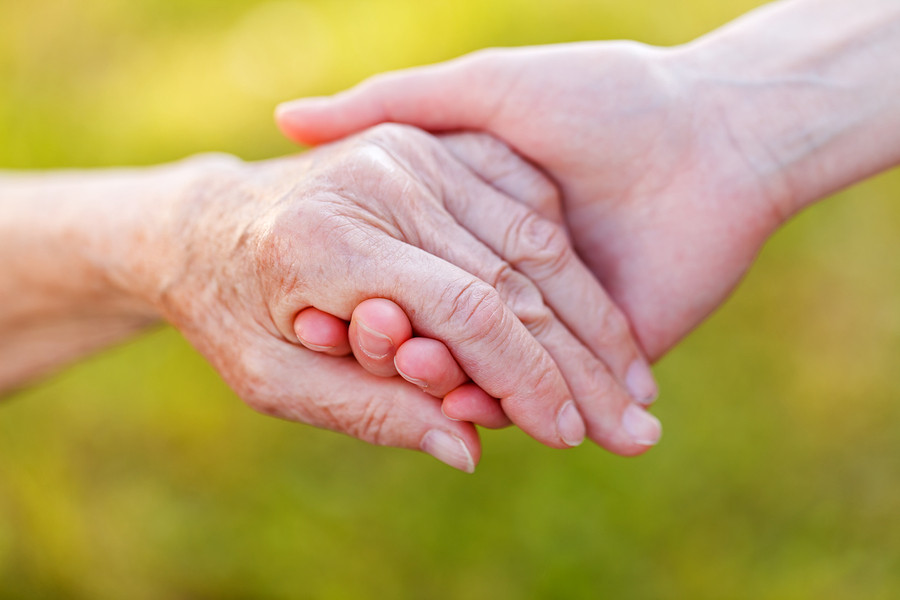When caring for a loved one, many caregivers go it alone

History is repeating itself in my family. My mother has Parkinson’s disease, and my father is her caregiver. Forty years ago, my mom was the caregiver for her own mother, who had advanced Parkinson’s disease and dementia.
I didn’t know my grandmother before she became frail and sick, but I knew that her children adored her. They couldn’t bear to place her in a nursing home, so they took six-month turns caring for her in their own homes. Every day, my mother would bathe my grandmother, dress her, feed her, and make sure she took her medications. She had no additional help, and no support from my grandmother’s doctors. It was exhausting for my mother, and I felt her anguish.
That was in the mid-1970s, when being a caregiver wasn’t a defined role. Now it’s so commonplace that researchers study caregiving. They estimate that 43.5 million people in our country provide in-home, long-term care for older adult family members with a chronic illness. There’s even an entire industry of services tailored to aging in place.
But despite the awareness of these roles, and the support services now available, the attention paid to caregivers isn’t much different than when I was a kid. In fact, a report published today in JAMA finds that many physicians overlook caregiver burden.
“Most physicians haven’t been trained to ask patients about it, and it’s a new clinical habit that you have to consciously adopt and work on,” says geriatrician Dr. Anne Fabiny, medical editor of Caregiver’s Handbook, a Special Health Report from Harvard Medical School.
The authors of the JAMA study found that caregivers are typically women who spend about 20 to 40 hours a week providing care. They also found that most caregivers feel abandoned and unrecognized by the health care system. Spousal caregivers face greater challenges than caregivers helping a parent for a variety of reasons, one of which is that they tend to be older.
Of these caregivers, 32% have a high caregiver burden. There is no medical classification for “caregiver burden.” But it’s generally known as the toll that caregiving takes on a person. It can manifest in many ways, including physical ailments, mental illness, social isolation, and financial problems. “Caregivers get depressed. Then they neglect their own health or they miss doctor appointments because they can’t extract themselves from their caregiving role. They just don’t have support, so things like exercising, getting enough sleep, or engaging in a social life all fall away,” says Dr. Fabiny.
The JAMA study cites cases of elderly caregivers who are so distraught that they try to commit suicide just to get out of the situation. The authors of the JAMA report and others are urging physicians to help prevent or reduce mounting desperation among caregivers by playing a part in assessing the caregiver’s health during regular clinic visits for the person who is chronically ill.
Physicians can evaluate the caregiver by asking:
- How are you coping with these responsibilities?
- How would you describe your quality of life these days?
- How often do you get out?
- Do you have your own physician?
The answers can help physicians direct caregivers to various services and support systems. These include:
- respite for the caregiver, in the form of a home companion or an adult daycare program for the patient
- help with non-medical services such as housekeeping and cooking
- counseling about caregiver stress and its consequences, from either a therapist or support group
- training so the caregiver learns how to care for her or his loved one without injury, such as learning how to lift the person without suffering back strain.
It’s the type of support that would have eased my mother’s burden when I was a kid. And it’s especially important to me now that my parents are in a spousal-caregiver relationship. I might worry about my father, a prince who never complains, except that the situation is a little different this time around. First, my mother is not as ill as my grandmother was. Second, my parents have me, a bossy health reporter, who is aware of support options and quick to arrange them. Not everyone has that kind of inside scoop.
So I’m grateful that the medical community is stepping up to the plate and shining the spotlight on caregiver wellness.
“The person you’re caring for is only as good as you are, and if you don’t take care of yourself, you can’t take care of the person you love and are responsible for,” advises Dr. Fabiny.
The Caregiver’s Handbook includes a detailed questionnaire to help caregivers identify problems and solutions for their caregiving situations. It also offers suggestions for legal and financial planning and tips for taking care of yourself as the caregiver, with emphasis on your own health and remembering to exercise, eat right, and see friends and family.
About the Author

Heidi Godman, Executive Editor, Harvard Health Letter
Disclaimer:
As a service to our readers, Harvard Health Publishing provides access to our library of archived content. Please note the date of last review or update on all articles.
No content on this site, regardless of date, should ever be used as a substitute for direct medical advice from your doctor or other qualified clinician.















